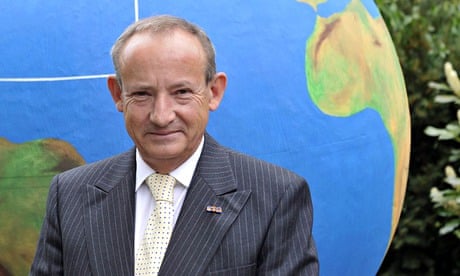Efforts to tackle climate change must urgently focus on implementing low carbon technologies such as wind and solar power rather than discussions of the science and quarrels over policy, the former United Nations climate chief has said.
Yvo de Boer headed the UN Framework Convention on Climate Change from 2006 to 2010, and was the chief mover behind the Copenhagen climate summit in 2009. Since then, he has acted as global chairman for climate change and sustainability services at the consultancy KPMG, but he is now leaving to take up a new post as director-general of the Global Green Growth Institute.
De Boer told the Guardian: "It's about implementation now. We need to focus on helping countries to formulate programmes they can take to the bank, working with countries to tap into finance mechanisms that are out there [for their low-carbon projects]."
He said key sources of finance were still largely untapped, including pension funds, which he said had a clear interest in long-term investments that would help to head off the worst dangers of climate change. The UN-sponsored Green Climate Fund would also provide a strong source of finance, de Boer predicted, though the slow progress on setting up the fund and disbursing cash has frustrated many international green campaigners.
But de Boer said that "non-state actors" from the private sector would also play a key role in the future, by cutting their own greenhouse gas emissions and helping others to do the same. "Private sector organisations have a lot of knowledge in this area, and they are focused on delivery," he said.
Based in Seoul and partly funded by the South Korean government, the Global Green Growth Institute has operations in 32 countries, conducting macro-economic assessments of how countries can move to a greener economy, and fianncing projects that forward these aims. De Boer will serve a four-year term starting on April 15.
The UN negotiations, which de Boer led as executive secretary of the UNFCCC, are now approaching a critical phase. Next Monday, work will begin among all the world's governments on drafting a text for a potential new agreement on the climate, to take effect from 2020. The new treaty or legally binding pact – the exact form has yet to be decided – and which is being championed by de Boer's successor, Christiana Figueres, would be the first to bind both developed and developing countries to a long-term low-carbon future. But there is still little agreement on how the accord should take shape, and countries must come up with plans for drastic emissions cuts before a crunch meeting in Paris late next year.
De Boer said that the talks were vital but that there should also be an emphasis on making a difference through practical projects to reduce emissions. "At a time when so much of the international focus seems to be on the negotiations, I look forward to working with countries on delivering [a low-carbon future] that is not just in national interests but in the global interest."
The GGGI has about 100 staff, with offices in Copenhagen, London and Dubai as well as Seoul.
De Boer said: "The GGGI's work can add value to creating prosperity at a time when humans are experiencing challenges such as climate change, energy, water, population growth, and an increase in urbanisation. Multiple challenges faced by humanity can only be effectively addressed through the shift toward economic growth in a more sustainable manner."
